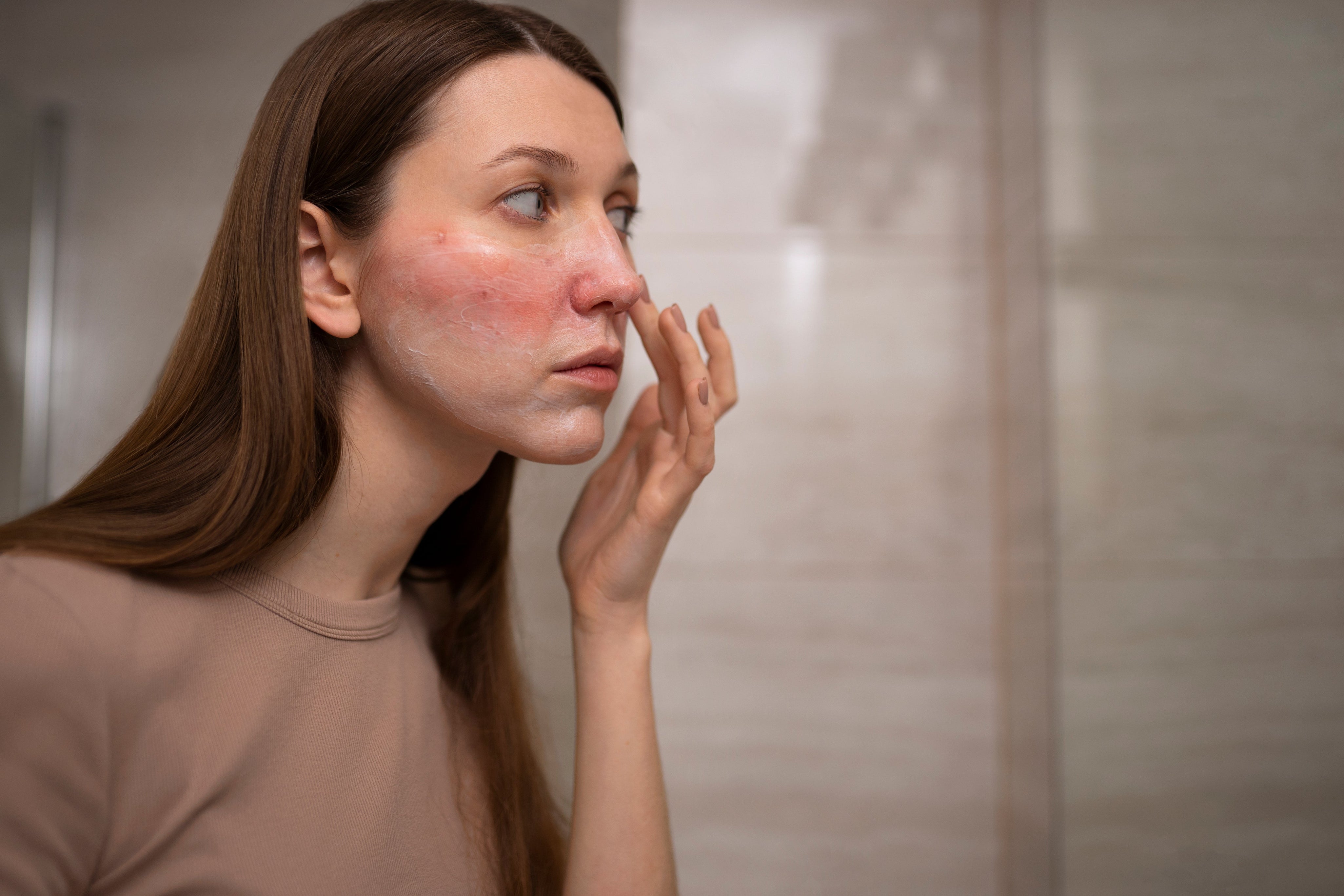Melasma Treatment Guide: The Best Options for Reducing Dark Patches

Navigating the landscape of melasma treatments can be complex, there are a number of treatment options available, ranging from topical creams to sophisticated laser therapies. This comprehensive guide delves into the intricacies of melasma, exploring its causes, distinguishing it from other forms of pigmentation, and providing insights into both at-home and professional treatment avenues.
What is Melasma?
Melasma is a common skin condition characterized by dark, discolored patches, primarily on the face. It often appears on the cheeks, forehead, nose, and upper lip and is more prevalent in women, particularly during hormonal changes such as pregnancy or menopause.
How do dermatologists diagnose melasma?
Dermatologists typically diagnose melasma through a visual examination of the affected skin. In some cases, they may use a Wood's lamp, which uses ultraviolet light to help determine the depth of the pigmentation. A thorough medical history and discussion of potential triggers, such as hormonal changes or sun exposure, are also essential in the diagnostic process.
Does Melasma Go Away?
Melasma may fade over time, particularly with effective treatment and lifestyle changes, but it can also recur. Many individuals find that their melasma becomes more pronounced with sun exposure or hormonal fluctuations, making ongoing management vital.
Melasma vs Pigmentation - How To Tell the Difference
While melasma is a type of hyperpigmentation, not all hyperpigmentation is melasma. Melasma typically presents as symmetrical patches and is often triggered by hormonal changes, whereas other forms of pigmentation may result from sun exposure or skin injury. Consulting a dermatologist can help clarify the type of pigmentation and the best treatment approach.
Read More: Hyperpigmentation vs. Melasma: How to Tell Them Apart
Medication and Treatment Options for Melasma
Sun Protection
The first line of defense against melasma is diligent sun protection. Daily application of broad-spectrum sunscreen with an SPF of 30 or higher is crucial, as UV exposure can exacerbate melasma.

Creams
Several topical treatments can help lighten melasma:
- Hydroquinone: This powerful bleaching agent works by inhibiting the enzyme tyrosinase, which is crucial for melanin production. By reducing melanin in dark patches, hydroquinone helps to lighten hyperpigmentation associated with melasma, making it a popular choice for treating this condition.
Disclaimer: Hydroquinone should be used under the guidance of a healthcare professional, as it may cause side effects or skin irritation in some individuals. Always perform a patch test before use and consult a dermatologist if you have concerns.
- Kojic Acid: Derived from fungi, kojic acid has skin-lightening properties that work similarly to hydroquinone. It also inhibits tyrosinase and has antioxidant benefits, making it effective in reducing the appearance of melasma while promoting a more even skin tone.


- Azelaic Acid: This multi-tasking ingredient is effective for various skin concerns, including melasma. It not only helps to inhibit melanin production but also has anti-inflammatory properties, making it suitable for sensitive skin. Azelaic acid can improve skin texture and clarity, helping to even out skin tone over time.
 Dermaceutic Dual+ with Azelaic Acid
Dermaceutic Dual+ with Azelaic Acid
- Retinoids: These vitamin A derivatives promote cell turnover and encourage the shedding of pigmented skin cells. By speeding up the skin's renewal process, retinoids can lighten dark patches associated with melasma and improve overall skin texture. They also stimulate collagen production, which benefits skin health in general.
Peels
Chemical peels, particularly those containing glycolic acid, can help exfoliate the skin and reduce dark patches over time, including melasma.

Professional Treatments
1. Microdermabrasion
This non-invasive treatment involves exfoliating the top layer of skin, helping to lighten melasma and improve skin texture.
2. Laser Therapy
Several types of lasers can effectively treat melasma by targeting pigmented areas without damaging the surrounding skin. Options include Q-switch and Picosecond Lasers are the best options when wanting to treat any pigmentation condition.
3. Chemical Peels
Chemical peels utilise specially formulated solutions to exfoliate the skin, effectively addressing issues like melasma while promoting a more even and radiant skin tone. This type of treatment works by removing the outer layers of dead skin cells, revealing healthier skin underneath. As a result, it not only helps to reduce the appearance of dark spots and pigmentation but also enhances overall skin texture and clarity, making it a popular choice for those seeking a refreshed complexion.
Tips to Prevent Melasma
1. Wear Sunscreen Daily
Make sunscreen application a non-negotiable part of your routine, as protecting your skin from UV rays is crucial in preventing melasma flare-ups.
2. Avoid Hormonal Triggers
If you notice melasma worsening with hormonal changes (e.g., pregnancy, birth control), discuss alternatives with your healthcare provider.
3. Maintain a Healthy Skincare Routine
Incorporate gentle exfoliation and hydrating products to promote skin health and prevent pigmentation issues.
4. Opt for Gentle Skincare Products
Choosing products that are gentle on the skin can prevent irritation, which might exacerbate melasma. Look for fragrance-free, non-comedogenic, and hypoallergenic labels to reduce the risk of inflammation or adverse reactions that might intensify discoloration.
5. Consider Antioxidant Supplements
Incorporating antioxidants in your skincare or diet can be beneficial. Ingredients such as Vitamin C and E help combat oxidative stress and protect the skin from environmental damage, potentially reducing the appearance of melasma while bolstering overall skin vitality.
6. Stay Hydrated
Keeping your skin and body well-hydrated is a simple yet effective way to maintain skin health. Adequate hydration helps maintain the skin's barrier function, making it less susceptible to pigmentation changes.
When to Seek Professional Help
If over-the-counter treatments and lifestyle changes do not yield results after several months, or if you experience severe or rapidly changing pigmentation, seek advice from skin experts. They can recommend personalised treatment options to address melasma based its severity.
Get the Mother's Day Consultation + Treatment Offer by Skin to Heart
This Mother’s Day, take the opportunity to prioritise your skin with a special consultation and treatment offer—a perfect time to get expert guidance on managing melasma effectively. At Skin to Heart, we provide tailored solutions to help you achieve clearer, more even-toned skin.
Experience Radiant Skin with a Holistic Rejuvenation Approach
Unveil the secret to flawless skin with our exclusive range of scientifically-backed skincare products and treatments tailored to address all your needs. From melasma to general skin rejuvenation, Skin to Heart's bespoke treatments and formulations are specially designed to help you achieve radiant, healthy, and confident skin. Book a consultation with us today to embark on your journey towards rejuvenated skin. Transform your skincare journey today and experience the delicate balance of science and nature at its finest. Your radiant skin awaits.
- Tags: pigmentation
0 comments


